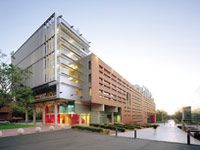|
|||||||||||||||||||||||||||||||||||||||||
| Biostatistics - 8751 | |||||||||||||||||||||||||||||||||||||||||
Biostatistics is the development and application of statistical science to research in health-related fields, including medicine, biology, public health and epidemiology. The field of biostatistics has become indispensable in improving health and reducing illness. Biostatisticians play essential roles in designing studies, analysing data and creating methods to attack research problems as diverse as:
The science of Biostatistics is critical for the correct design of medical trials and obtaining ethics approval for their conduct. It is also essential in genetic research particularly in discovering key genetic mechanisms occurring in disease processes. The degree of Master of Biostatistics is internationally recognised and graduates from high quality programs are in high demand in industry and government, particularly by pharmaceutical companies and drug regulators as well as medical investigators and public health researchers and policy groups. A strong demand for biostatisticians in Australia and the neighbouring regions is expected. In order to provide students with a route to high quality careers in Biostatistics, we introduce in 2007 a Master of Biostatistics Program located in the Department of Statistics of the School of Mathematics and Statistics at the University of New South Wales. The program will provide advanced coursework training in biostatistical theory and methods using an on-campus delivery mode with a significant project component.
Program Objectives and Learning Outcomes The program is oriented towards graduates with a degree in an area with a significant quantitative component (such as Science, Engineering, Finance, Economics, Actuarial science, Psychology, Epidemiology or Bioinformatics), who wish to develop their knowledge and skills in statistical and computational methods appropriate to biostatistics. It is an appropriate program for graduates who wish to work as biostatisticians. The program draws on contributions from specialists in Statistics and Public Health at UNSW as well as relevant UNSW Research Centres and Hospitals for which Biostatistics is essential.
Students will learn the key theories and their application in a variety of modes including class room instruction at an advanced level, project work within the various required and elective courses, interaction with researchers in relevant discipline areas and transfer of knowledge especially in computer methods and software package use and project preparation and presentation via teamwork. Course based individual and group assignments and presentations, individual and group computer project work and data analysis, course mid-session tests and final exams and preparation of a substantial report. Entry to the Program is available in Session 1 only. The program consists of ten courses, each of 6 units of credit (UOC) and a project of 12 UOC. The possibility to take some courses in other Schools at UNSW or at other Universities exists with the approval of the Head of School of Mathematics and Statistics.
The total number of UOC required for graduation: 72. The Project has 12 UOC. Unless otherwise stated, all courses listed below have 6 UOC and consist of two hours of lectures and one hour of flexible tutorial or laboratory per week. Required Project
Core courses
A minimum of 18 units of credit from the following Elective Courses (or other courses approved by Head of School):
Students with a prior undergraduate major or minor in Statistics of sufficient standard can enter the program directly. Students with sufficient prior knowledge in mathematics but without adequate prior knowledge in Statistics can enter the program but it will be recommended that they take MATH5846 and MATH5856 in their first semester of enrolment. Prior completion of undergraduate mathematics in algebra, linear algebra, calculus including multivariable calculus, introduction to sequences and series and a first course in applied statistics should provide sufficient background for students without a minor or major in Statistics.
After Session 1 students may choose not to graduate from the Master of Biostatistics and instead apply to transfer to either the Graduate Diploma in Statistics or Master of Statistics Program provided the rules of admission into those degrees are satisfied. Students who initially satisfied the criteria for the Master of Biostatistics Program but enrolled into the Graduate Diploma in Statistics or Master of Statistics Program may transfer to the Master of Biostatistics Program after Session 1. The Program Authority may approve transfer of credit for students who wish to transfer to the Master of Biostatistics Program from either the Graduate Diploma in Statistics or Master of Statistics. Students who initially are enrolled in the Graduate Certificate in Statistics may choose not to graduate from the Graduate Certificate in Statistics but instead apply to upgrade to the Master of Biostatistics provided their average grade in the two compulsory courses is at least 65%. For information regarding fees for UNSW programs, please refer to the following website: https://my.unsw.edu.au/student/fees/FeesMainPage.html
|
|||||||||||||||||||||||||||||||||||||||||



